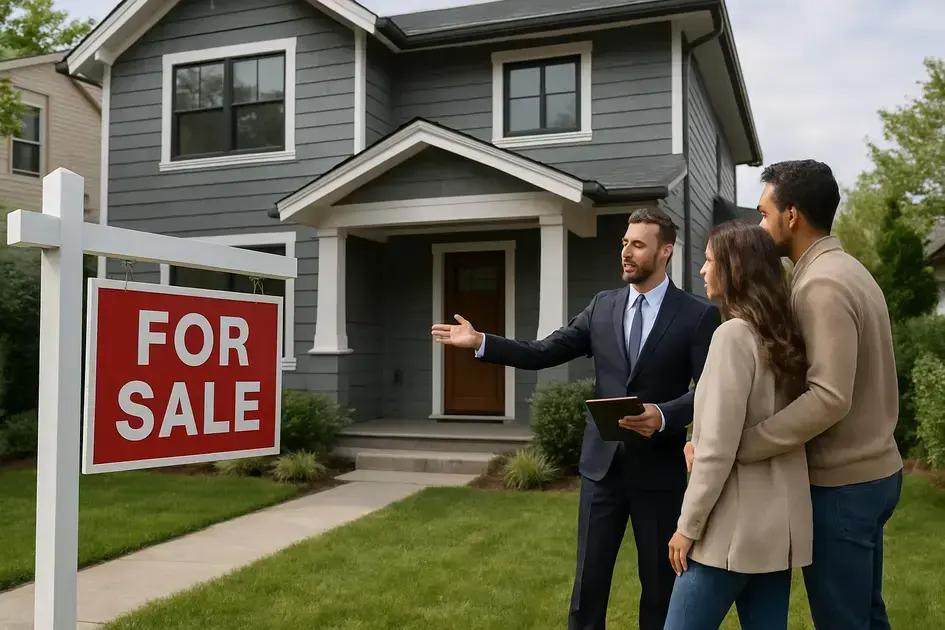House flipping is the process of buying undervalued properties, renovating them efficiently, and selling quickly to earn a profit while managing costs, market trends, legal requirements, and financing options.
Já pensou em ganhar dinheiro reformando e vendendo casas? O house flipping tem atraído muita gente por permitir ganhos rápidos no mercado imobiliário, mas será que vale para você? Vamos conversar sobre o que realmente importa para ter sucesso nessa estratégia.
o que é house flipping e como funciona
House flipping is the process of buying a property, renovating it, and selling it quickly for a profit. This strategy relies on purchasing homes at a lower price, improving their condition and appeal, then selling them at a higher price. The key is to understand market trends, renovation costs, and timing to maximize gains.
The first step usually involves finding undervalued homes or distressed properties that need repairs. Investors must evaluate potential repairs carefully to estimate renovation expenses. A detailed budget plan and timeline are essential to avoid overspending and delays.
During renovation, focus on improvements that add the most value, like updating kitchens and bathrooms, improving curb appeal with paint and landscaping, and fixing structural issues. Efficient project management is crucial to complete the work quickly without sacrificing quality.
Once renovations are done, the property is listed for sale. Pricing it correctly according to the local market improves the chances of a fast sale. House flipping demands knowledge of the real estate market, good negotiation skills, and financial planning.
Successful house flipping combines smart buying, cost-effective renovations, and quick selling strategies. It can be a profitable venture, but it requires careful research, hands-on work, and risk management.
principais vantagens e riscos do house flipping
House flipping offers several advantages, including the potential for quick profits by renovating and selling properties in a short time. This can create a steady income stream for investors who understand the market well. Additionally, flipping homes allows you to improve neighborhoods, as renovated houses can increase local property values.
Another advantage is the ability to build real estate investment experience. By working hands-on with properties, you gain valuable skills in construction, budgeting, and market evaluation. This experience can open doors to larger investment opportunities.
Risks to Consider
Despite its benefits, house flipping has significant risks. Market fluctuations can reduce property values unexpectedly, causing losses. Renovation costs might go beyond initial estimates due to hidden problems like structural damage or outdated wiring.
Time is another critical factor. Delays in repairs or selling the property can eat into profits and increase holding costs such as mortgage payments, taxes, and insurance. Inadequate research or poor planning can lead to buying properties in less desirable areas, making it harder to sell.
There is also a risk related to financing. Many flippers use loans or credit, and failing to sell quickly can lead to financial strain if debts accumulate.
Understanding both the advantages and risks helps investors make informed decisions and prepare strategies to protect their investment in house flipping.
como escolher o imóvel ideal para reformar

Choosing the right property to flip is crucial for success. Start by looking for homes in promising neighborhoods with growing demand. Research local market trends and recent sales to identify areas where property values are likely to rise.
Condition of the property matters a lot. Look for houses that need cosmetic fixes rather than major structural repairs, which can be costly and time-consuming. A home with a solid foundation, roof, and plumbing reduces unexpected expenses.
Consider the size and layout—properties with popular floor plans tend to sell faster. Also, check the location carefully; proximity to schools, public transportation, and amenities increases appeal.
Inspections and Evaluations
Always conduct a professional home inspection before buying. This helps uncover hidden issues like mold, pests, or electrical problems. Evaluating renovation costs upfront ensures the project stays within budget.
Finally, consider your target market. Will the flipped home attract first-time buyers, families, or investors? Tailoring your choice to buyers’ preferences increases the chance of a quick sale and good return.
dicas para avaliar custos e orçamento da reforma
Evaluating renovation costs accurately is essential to keep your house flipping project profitable. Start by making a detailed list of all the repairs and upgrades needed, from major work like roofing and plumbing to smaller fixes like painting and landscaping.
Get multiple quotes from contractors to compare prices and avoid surprises. Make sure the quotes include materials, labor, permits, and possible extra expenses.
Set aside a contingency budget, usually around 10-15%, for unexpected costs that often arise during renovations. This reserve helps prevent your project from going over budget.
Creating a realistic budget plan
Break down all expenses into categories such as materials, labor, permits, and inspection fees. Prioritize improvements that add the most value to the property. For example, kitchen and bathroom upgrades often yield high returns.
Track your spending closely throughout the project to stay on budget. Using budgeting software or spreadsheets can help you monitor costs in real time and adjust plans if necessary.
Remember that time is money. Delays in renovations can increase holding costs like mortgage payments and utilities, so plan timelines carefully and communicate regularly with your contractors.
técnicas para valorizar o imóvel com melhorias
Adding value to a property through improvements is key to maximizing profits in house flipping. Focus on upgrades that appeal to potential buyers and offer high returns.
Kitchen and bathroom remodels are among the most effective improvements. Updating appliances, fixtures, and countertops can greatly increase appeal. Even minor changes like new cabinet handles or fresh paint can make a big impact.
Enhancing curb appeal
First impressions matter. Simple landscaping, a fresh coat of exterior paint, and modern lighting can boost the home’s attractiveness. Repairing driveways and walkways also add value.
Energy-efficient upgrades like new windows, insulation, and LED lighting are increasingly popular. They not only lower utility costs but also attract eco-conscious buyers.
Updating flooring with hardwood or quality laminate gives a modern and clean look. Open floor plans or removing non-structural walls can create more inviting spaces.
Don’t forget small details such as new door hardware, updated light fixtures, and fresh interior paint in neutral colors. These inexpensive touches enhance the overall feel and can help your property stand out.
estratégias para vender rápido e maximizar lucros

Selling a flipped house quickly and maximizing profit requires smart strategies. Start by pricing the property competitively, based on recent sales of similar homes in the area. Avoid overpricing, which can lead to longer time on the market and added holding costs.
Effective marketing is essential. Use professional photos and highlight the key improvements made during the renovation. Online listings, social media, and real estate platforms increase exposure and attract more potential buyers.
Preparing the home for sale
Ensure the house is clean and well-staged to help buyers imagine themselves living there. Declutter spaces, add fresh flowers or neutral decorations, and fix minor issues like squeaky doors or chipped paint.
Work with an experienced real estate agent who understands the local market and can negotiate effectively on your behalf. They can also provide insights on optimal listing times.
Consider offering incentives such as flexible closing dates or covering some closing costs to motivate buyers. Quick responses to inquiries and scheduling showings promptly also improve your chances of a fast sale.
Timing the sale is important. The real estate market fluctuates seasonally, with spring and summer often being the best times to sell. Keeping an eye on market conditions helps you choose the ideal moment to list.
aspectos legais e cuidados fiscais no house flipping
Understanding the legal and tax aspects of house flipping is vital to protect your investment and avoid penalties. Before starting, research local zoning laws, permits, and building codes to ensure your renovations comply with regulations. Failing to secure proper permits can result in fines or even halt the project.
Contracts and agreements with contractors and buyers should be clear and legally binding. This helps prevent disputes and ensures all parties understand their responsibilities.
Tax considerations
Profits from house flipping are typically considered ordinary income and may be taxed at a higher rate than long-term capital gains. Keep detailed records of all expenses and income related to each project to accurately report earnings and deductions.
You may also be subject to self-employment tax if flipping is your primary business. Consulting with a tax professional can help you understand deductions, such as mortgage interest, property taxes, and renovation costs, which can lower your taxable income.
Legal risks include potential issues with property titles, liens, or undisclosed defects. Conduct thorough due diligence before purchasing a property and consider title insurance for added protection.
Staying informed about legal requirements and tax obligations ensures smoother transactions and helps maximize your profits in house flipping ventures.
como financiar seu projeto sem complicações
Financing your house flipping project doesn’t have to be complicated if you understand your options and plan accordingly. One common method is using a traditional mortgage loan, but banks usually require good credit and proof of income, which might be challenging for flippers.
Another option is a hard money loan, which is a short-term loan from private lenders. These loans are easier to get but come with higher interest rates and fees. They are ideal for quick flips due to fast approval and funding.
Other financing alternatives
Consider partnerships with investors who provide capital in exchange for a share of the profits. This reduces your upfront costs but requires clear agreements.
Home equity loans or lines of credit can also be used if you own other properties with available equity. These options offer lower interest rates but involve risk since your property serves as collateral.
Accurate budgeting and cash flow analysis are important before securing financing. Know exactly how much money you need and how long the project will take to avoid unexpected expenses.
Maintain transparent communication with lenders and keep thorough records of all transactions to simplify the repayment process and build trust for future projects.
histórias reais de sucesso no house flipping

Many investors have found success in house flipping by combining smart strategies and careful planning. One example is a couple who bought a rundown property in a growing neighborhood. They focused on cost-effective renovations like updating the kitchen, repainting walls in neutral colors, and improving the landscaping. Within six months, they sold the home for a profit that covered their costs and earned them extra income.
Another story involves an individual who targeted homes with minor cosmetic issues. By doing most of the work personally, including painting and flooring, this investor kept expenses low and increased the resale value significantly. This approach worked well because they understood the local market and buyer preferences.
Lessons from real successes
These stories highlight the importance of research, budgeting, and hands-on work. Successful flippers also emphasize quick decision-making and flexibility to adapt to unexpected challenges during renovations.
Some investors partner with experienced contractors or real estate agents to access expert advice and streamline the flipping process. Others leverage local market knowledge to find hidden gems and undervalued properties.
Overall, these success stories show that with dedication and smart planning, house flipping can be a profitable and rewarding venture.
tendências do mercado imobiliário para investidores
The real estate market is constantly evolving, and investors must stay updated on the latest trends to make smart decisions. One major trend is the growing demand for sustainable and energy-efficient homes. Buyers increasingly prefer properties with green features, which can also lead to higher resale values.
Technology integration is another important trend. Smart home devices, security systems, and automated appliances attract modern buyers looking for convenience and innovation.
Impact of remote work
The rise of remote work has shifted preferences toward homes with dedicated office spaces and proximity to outdoor areas. Suburban and rural properties are gaining popularity as buyers seek more space and better quality of life.
Investors are also noticing the impact of changing demographics, such as millennials entering the housing market and baby boomers downsizing. This affects the types of properties in demand, like affordable starter homes and accessible retirement options.
Short-term rental markets are booming in many areas, offering investors the chance to generate income through platforms like Airbnb. However, regulations around short-term rentals vary widely and must be considered.
Keeping an eye on interest rates, local economic conditions, and government policies can help investors anticipate market fluctuations and adjust their strategies accordingly.
Final thoughts on house flipping success
House flipping can be a rewarding way to earn profits and gain experience in real estate investing. Understanding the market, managing costs, and making smart improvements are key to maximizing returns.
Staying informed about legal, financial, and market trends helps avoid common pitfalls and keeps projects running smoothly.
With careful planning and dedication, house flipping offers great potential for building wealth and transforming properties into valuable homes.
FAQ – common questions about house flipping
What is house flipping and how does it work?
House flipping is buying a property, renovating it, and selling it quickly for a profit. Success depends on smart buying, budgeting, and timely selling.
What are the main risks involved in house flipping?
Risks include unexpected repair costs, market value changes, project delays, and financing challenges that can impact profits.
How do I choose the right property to flip?
Look for undervalued homes in growing neighborhoods with manageable repair needs, good location, and layouts that appeal to buyers.
What financing options are available for house flipping projects?
Options include traditional loans, hard money loans, partnerships, and home equity lines. Each has pros and cons related to cost and approval time.
How can I increase the value of a property before selling?
Focus on key improvements like kitchen and bathroom updates, curb appeal, energy efficiency, flooring, and small details like lighting and paint.
What legal and tax considerations should I be aware of?
Ensure compliance with permits and zoning laws, maintain clear contracts, report income accurately, and understand tax liabilities related to flipping profits.
